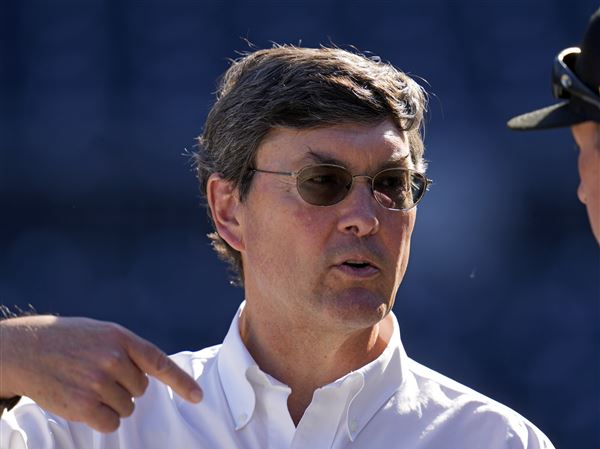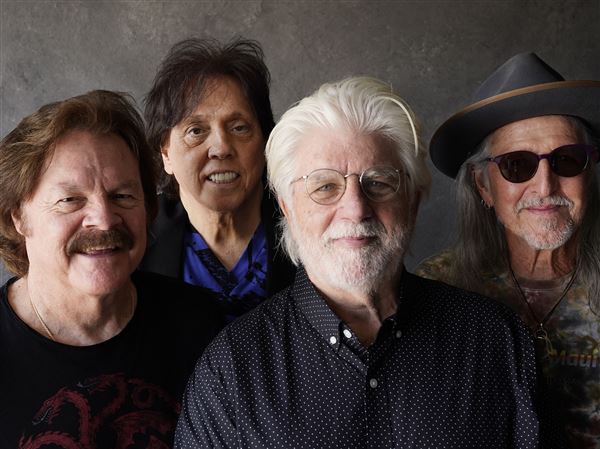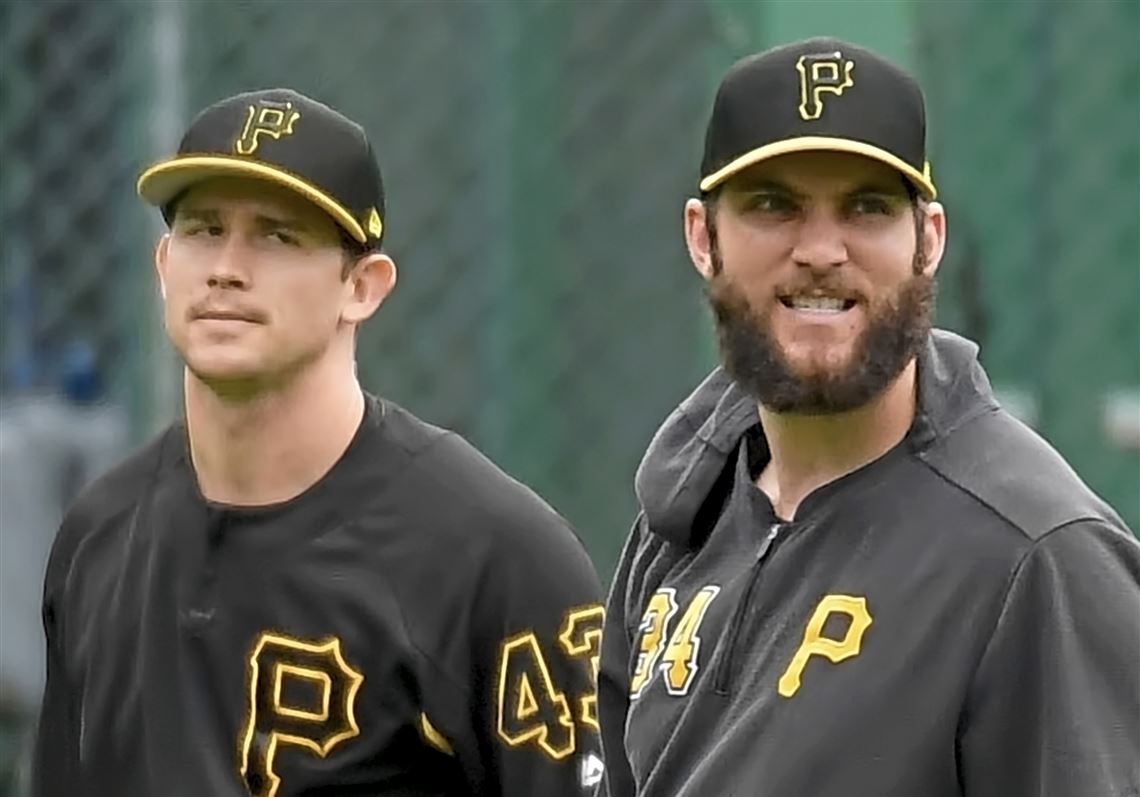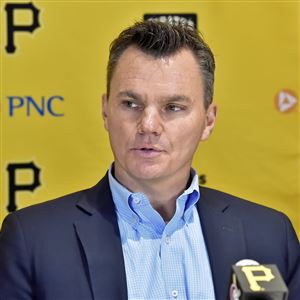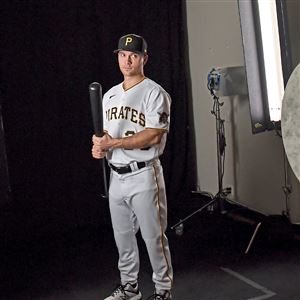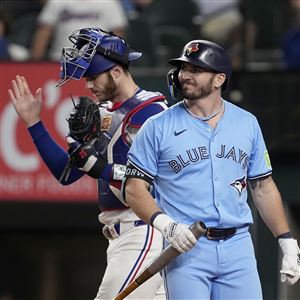BRADENTON, Fla. — It’s been arguably the biggest question on the minds of Pirates fans recently.
And for good reason.
How, many have wondered, do the Pirates reasonably expect to win more than 69 games if they didn’t make any offseason major additions and they also said goodbye to one of their best players in Starling Marte?
Good question. Fair question. But the answer is rather simple: It’s pitching. From the first inning through the ninth, the Pirates must pitch markedly better than they did last season if they want to give themselves a puncher’s chance.
Although they finished 11th out of 15 teams in the National League last year in runs, the Pirates (758) weren’t terribly far behind the Cardinals (10th, 764) or the Brewers (9th, 769). The difference was pitching, as the Pirates had the fifth-worst ERA (5.18) in all of baseball.
The man charged with resuscitating the Pirates’ entire pitching program is Oscar Marin, a 37-year-old Los Angeles native who a couple months ago became a major league pitching coach for the first time.
We chatted with Marin on Saturday at Pirate City. Here are five key things we learned from that conversation.
1. It’s early, but Marin clearly likes what he sees out of the Pirates’ pitchers. And while the first week is not yet time to talk about the composition of the starting rotation or who will get the ball on Opening Day, it should go a long way toward establishing trust between both sides.
“That’s the No. 1 thing that needs to happen — building trust with these guys and making sure that we’re building a relationship and getting to know them as people, not just as players,” Marin said.
2. Marin is really, really into what he called “the new age of baseball and information,” and this will be big for the Pirates. Honestly, the trust thing is listed first because you won’t get very far with complex information without an established level of trust, but what Marin can do here may be the biggest thing that will affect change in a positive way.
The Pirates were somewhat reliant on technology last year, using things like Rapsodo and TrackMan, but several of the pitchers on staff said there was a breakdown in communication between information gathered and information applied.
That shouldn’t happen with Marin, who really started studying this stuff intensely in 2017 when he became the Seattle Mariners’ minor league pitching coordinator.
“We started going to different seminars, different universities and observing different styles of coaching, not just in baseball but even into the golf realm a little bit with how the body moves,” said Marin, who was an exercise science major at the University of Arkansas-Little Rock.
3. Rick Eckstein worked wonders with the Pirates hitters last season, most notably Josh Bell. He did it by relying on a similar approach — installing individualized plans and leaning hard on technology.
Eckstein had previously completed his certification for OnBase University, which is essentially a teaching and support program that focuses on the biomechanics of baseball, specifically how the body functions during hitting and pitching.
Marin completed the same program and recently had sort of a baseline chat with his pitchers, informing them what different stuff the would be doing this season and also how they would together learn from the information they gathered and adjust what they’re doing on an individual basis to put it into practice.
“We started with letting these guys know what that information is and what they were going to see out there,” Marin said. “The worst thing we wanted to do was put stuff out there, then they ask questions like, ‘OK, why is all this out here? How is it going to help me?’ So we had a meeting, a classroom session, just getting guys to understand what kind of information you can get off of Rapsodo, what are the benefits of an Edgertronic camera and how it can help us tunnel pitches. It’s just the explanation of it early on that really clarified it for those guys. Now they’re asking questions, which is exactly what we want.
“The last thing we wanted was to start talking about something they didn’t really understand and lose them from there.”
Marin completed his certification with Dr. Greg Rose, but he hardly views that as a cue to stop learning. Marin is truly passionate about this stuff and loves nerding out with all kinds of technology, discovering subtle ways to make these guys better.
4. How the pitchers work is also different. While Marin isn’t letting anyone off easy — pitchers throw a side session, take a two-day break, then throw another one — he is trying to be more intentional with everything they do.
One realistic way that has manifested itself a week into spring training is during those side sessions, when they’re monitored by significantly more coaches and analysts, and pitchers aren’t just randomly picking what they want to throw.
There are designed routines and sequences put together to achieve a specific goal, with Marin trying to not waste a single minute while his pitchers are on the mound.
“Getting a little bit more of a workload and the intent behind what they’re doing is really exciting right now,” Marin said.
5. Marin wasn’t ready to talk about who has the inside track on winning jobs, but he does like what he’s seen from Trevor Williams and Mitch Keller, two guys he was asked about specifically. Williams has been able to engage his lower half more and consistently repeat his delivery. In Keller, Marin is seeing “that power-pitcher effect.”
Already just a week in, Marin has gotten rave reviews from his pitchers, many of whom struck up a relationship with their new pitching coach when he connected with them and their offseason trainers over the past few months, trying to learn what they like to do and blend it with what the Pirates want.
“I think that’s the easiest way to get buy-in from guys and letting them know that we’re here to help them,” Marin said. “It doesn’t matter where the information comes from. The more information you can get, the better you can analyze what they’re doing.”
Jason Mackey: jmackey@post-gazette.com and Twitter @JMackeyPG.
First Published: February 16, 2020, 2:00 a.m.


